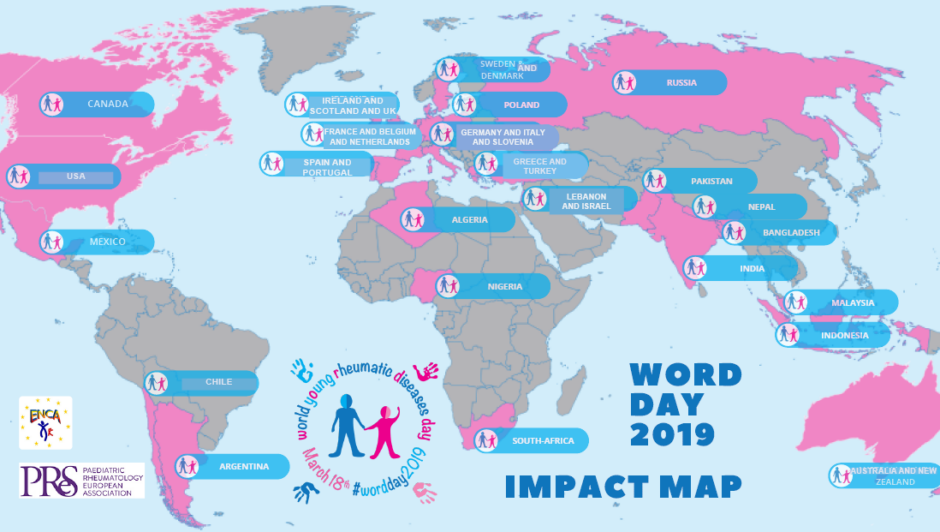INTRODUCTION
A summary of the first international awareness day for paediatric rheumatic diseases was presented as a webcast during the EULAR E-Congress of Rheumatology on 5th June 2020. Paediatric rheumatic diseases encompass a spectrum of musculoskeletal and connective tissue conditions which affect children and young people in many ways at a crucial time in their lives. Delays to diagnosis can have a significant impact on children and young people’s lives now, and in the future, and are reported around the world.1-3 It is also known that there is a lack of awareness of paediatric rheumatic diseases amongst the general public and certain groups of healthcare professionals, including primary care physicians.4
METHODS
To help improve international awareness and understanding of paediatric rheumatic diseases, World Young Rheumatic Diseases (WORD) Day5 was established on 18th March 2019. Its aim was to raise awareness of paediatric rheumatic diseases and the importance of timely referral, early diagnosis, and access to appropriate treatment and support. A steering committee consisting of patients, parents/carers, healthcare professionals, and researchers was established, and an external agency provided digital support. A social media campaign was launched in December 2018 to promote WORD Day, and analytics were used to measure its impact. Dissemination of WORD Day was achieved by engaging healthcare professional and patient/parent networks, as well as utilising social media to widen the reach of WORD Day.
RESULTS
Face-to-face and virtual events took place in 34 countries across six continents on or around WORD Day 2019 (Figure 1). Such events included lectures, workshops, social gatherings, sponsored activities, and media appearances. A total of 2,585 and 660 individuals followed the official Facebook and Twitter accounts, respectively, up until WORD Day. The official #WORDDay2019 hashtag was seen by 533,955 unique accounts on 18th March 2019 alone, with 3.3 million impressions.

Figure 1: WORD Day 2019 map of impact.
Countries participating in the first WORD Day, March 18th 2019.
WORD: World Young Rheumatic Diseases.
WORD Day 2019 was the first international campaign focussed solely on children and young people with paediatric rheumatic diseases. Individuals and organisations around the world were inspired to take action, no matter how small.
Organic and funded social media content further aided the dissemination of the WORD Day message, with Facebook proving to be a popular platform to disseminate messages. Despite a wealth of different published content and authentic materials, videos proved to be the most popular with users, particularly when featuring material designed by and with children and
young people. It demonstrated that despite awareness events often being resource-light, they can be implemented across a range of diverse settings.
CONCLUSION
WORD Day has now become an annual global awareness event taking place on March 18th, facilitated by a growing network of patient, parent, and professional community supporters. Everyone is invited to get involved in celebrating WORD Day and raising much-needed awareness of paediatric rheumatic diseases in every corner of society.








